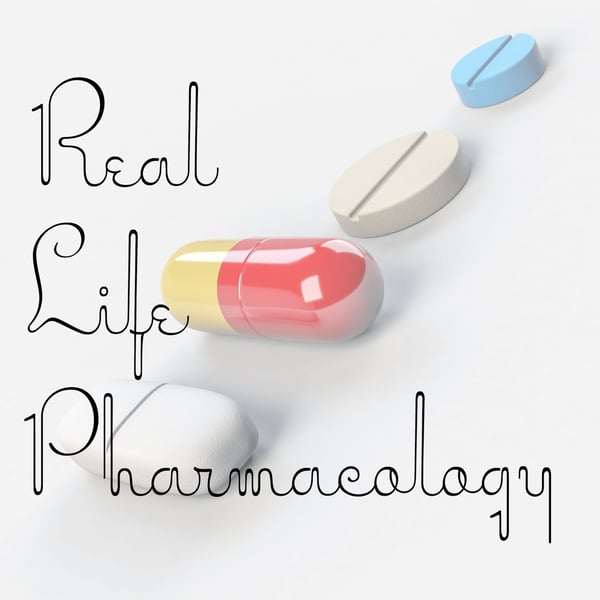Methimazole Pharmacology Podcast
Real Life Pharmacology - Pharmacology Education for Health Care Professionals
Eric Christianson, PharmD; Pharmacology Expert and Clinical Pharmacist
5 • 716 Ratings
🗓️ 5 January 2023
⏱️ 12 minutes
🧾️ Download transcript
Summary
Methimazole and propylthiouracil are from the same class of medications and are used for hyperthyroidism. I go over some of the differences between these agents in this podcast episode.
Methimazole is dosed once daily but can be split if the patient experiences significant GI adverse effects.
T3 plays an important role in hyperthyroidism. I discuss the physiologic of T3 production and how methimazole creates its effects to lower thyroid hormone levels.
Transcript
Click on a timestamp to play from that location
| 0:00.0 | Hey all, welcome back to the real-life pharmacology podcast. I'm your host, pharmacist, |
| 0:04.4 | is Derek Christensen. Thank you so much for listening today. Go to real-life pharmacology.com, |
| 0:09.9 | get your free 31-page PDF on the top 200 drugs. A great study guide, great refresher, |
| 0:16.9 | a great study tool. If you're taking pharmacology classes, board exams, absolutely a no-brainer |
| 0:23.6 | to go get that, simply an email. We'll get you access to that. All right, with that, let's get |
| 0:29.6 | into the drug of the day today. And that medication is methamazole. If you remember a few weeks ago, |
| 0:36.4 | I did propothia urosil, and these two medications are from the |
| 0:41.6 | same class of antithyroid medication. So why would we want to block thyroid hormone? Well, that's |
| 0:49.7 | probably pretty obvious if you've got a patient with hyperthyroidism. |
| 0:56.2 | Mechanistically, how does this drug work? |
| 0:59.3 | So ultimately, I think it's really important to remember T3, being one of the major thyroid |
| 1:06.1 | hormones, the most active thyroid hormone, and ultimately, methamazole is going to block the production of T3. |
| 1:17.1 | How it does that, it basically prevents iodine. |
| 1:20.8 | It prevents oxidation of iodine. |
| 1:23.9 | By doing that, that's a key player or a key role in the production formation of T3. |
| 1:32.7 | And so by blocking that process, ultimately you're going to block T3 formation. |
| 1:38.9 | Now, this is important to remember in the fact of a patient maybe with acute hyperthyroidism who's very symptomatic, |
| 1:47.8 | maybe they're a hospitalized patient, for example, in that methamazole doesn't touch circulating |
| 1:56.9 | T3-T-4. So again, that T-3 in the bloodstream, that's going to have the physiological action of thyroid hormone, |
| 2:07.1 | that's not going to be prevented or stopped by methamazole if it's already been produced. |
| 2:14.2 | What it's going to do, what the drug's going to do is prevent further production, |
| 2:18.9 | or at least reduce further production of T3 and ultimately bring down those levels. So it's, |
... |
Please login to see the full transcript.
Disclaimer: The podcast and artwork embedded on this page are from Eric Christianson, PharmD; Pharmacology Expert and Clinical Pharmacist, and are the property of its owner and not affiliated with or endorsed by Tapesearch.
Generated transcripts are the property of Eric Christianson, PharmD; Pharmacology Expert and Clinical Pharmacist and are distributed freely under the Fair Use doctrine. Transcripts generated by Tapesearch are not guaranteed to be accurate.
Copyright © Tapesearch 2025.

